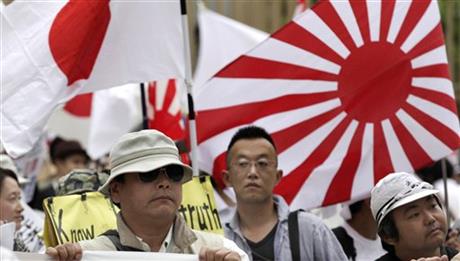
By MARI YAMAGUCHI
In this photo taken Sunday, May 19, 2013, nationalist protesters with Japanese flags, left, and Japan’s naval ensign, right, march through a Tokyo street to denounce”privileges” for Koreans residents in Japan. Anti-Korean rallies have escalated this year and spread to other cities with Korean communities. In Tokyo’s Shin-Okubo district, dotted with Korean restaurants and shops popular among South Korean pop-culture fans, hundreds of Zaitokukai members and supporters have called Koreans “cockroaches,” shouted “Kill Koreans” and threatened to “throw them into the sea.” (AP Photo/Shizuo Kambayashi)
TOKYO (AP) — A Japanese court on Monday ordered a group of anti-Korean activists to pay a Korean school in Kyoto 12 million yen ($120,000) in compensation for disturbing classes and scaring children by holding “hate speech” rallies outside the school.
The ruling acknowledged for the first time the explicit insults used in the rallies constituted racial discrimination, said human rights experts, lawmakers and others calling for restrictions on hate speech. They said the ruling could prompt a move to exempt such speech from Japan’s constitutional right to free speech.
Though attendance at such rallies has been limited to a few hundred people at most and they are far from becoming mainstream, similar demonstrations of nationalists targeting ethnic Koreans and other minorities have escalated since earlier this year, amid Japan’s chilly diplomatic relations with its Asian neighbors.
The rallies highlight why Japan’s conformist society has been criticized at home and abroad for being less accepting of racial and ethnic diversity. Discrimination against ethnic Koreans and Chinese dates from Japan’s expansionist era in the first half of the 20th century and still runs deep.
“Japanese society has been too insensitive to racial discrimination,” said Yoshifu Arita, an opposition lawmaker who is starting a parliamentary panel with a dozen colleagues to introduce hate speech legislation. “We must take steps to eradicate hate speech against Korean and Chinese people, and address broader discrimination problems.”
In the Kyoto District Court ruling, Presiding Judge Hitoshi Hashizume said the language that members of the anti-Korea group Zaitokukai and their supporters shouted and printed on banners during rallies in 2009 and 2010 was illegal, and had disturbed classes and scared the students. The judge said posting video footage of the rallies on the Web was illegal.
He said the rallies “constitute racial discrimination” defined under the United Nations’ convention on the elimination of racial discrimination, which Japan has ratified.
Monday’s ruling banned the group from staging further demonstrations in the neighborhood of the pro-Pyongyang Korean elementary school in southern Kyoto, according to court spokesman Naoki Yokota.
Arita said he hoped the ruling would put a brake on such hate speech rallies elsewhere in Japan.
Ikuo Gonoi, an associate professor Takachiho University In Tokyo who researches democracy and demonstrations, said legal restrictions on hate speech need to be carefully considered so the government won’t use them arbitrarily to restrict freedom of speech.
There are about 500,000 Koreans in Japan — the country’s largest ethnic minority group — and many are descendants of forced laborers shipped to Japan during its 1910-1945 colonial rule of Korea. They still face discrimination in education, marriage and jobs.
Anti-Korean rallies have escalated this year and spread to other cities with Korean communities. In Tokyo’s Shin-Okubo district, dotted with Korean restaurants and shops popular among South Korean pop-culture fans, hundreds of Zaitokukai members and supporters have called Koreans “cockroaches,” shouted “Kill Koreans” and threatened to “throw them into the sea.”
The rallies have grown more intense, with anti-racism activists yelling back and sometimes getting into scuffles. In June, Zaitokukai leader Makoto Sakurai and seven others from both sides were arrested.
Officials from Zaitokukai, which has more than 10,000 members, said they were protesting the Kyoto school’s use of a nearby city-run park without permission. They say they are protesting alleged “special privileges” given to ethnic Koreans, and say Japan’s welfare system is abused by Korean residents.
“Saying ‘Let’s kill Koreans’ isn’t illegal, so it’s OK to say that. We’ve kept quiet for too long and we’ve had enough,” Sakurai told The Associated Press at a rally earlier this year. “Koreans hate us so much so we just tell them to go home. Call us racists if you want.”
Shinichi Tokunaga, a lawyer for the group, criticized the ruling Monday for restricting political expression.
The school filed the lawsuit in June 2010 against the group and eight activists over rallies held on three occasions between December 2009 and March 2010. The activists threatened Koreans and called them names, causing some children to develop stomach pains, the lawsuit said.
Human rights experts say Zaitokukai and its sympathizers have intensified their campaign since the Liberal Democratic Party of nationalist Prime Minister Shinzo Abe returned to power last December.
During a parliamentary session in July, Abe called the group’s activities “regrettable.”



